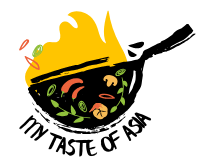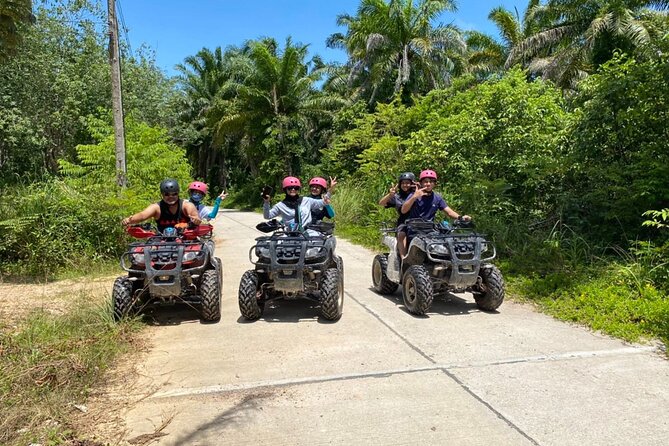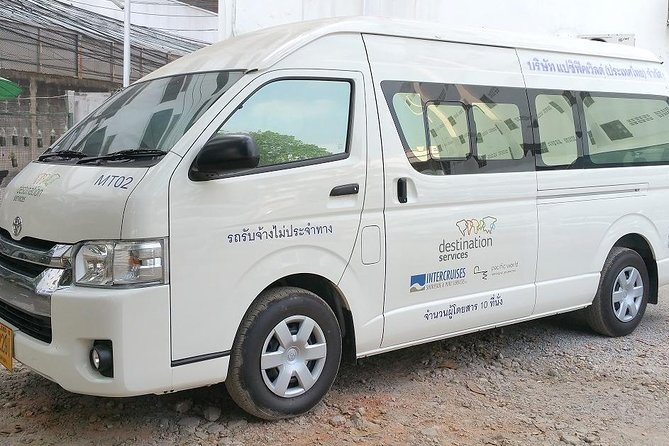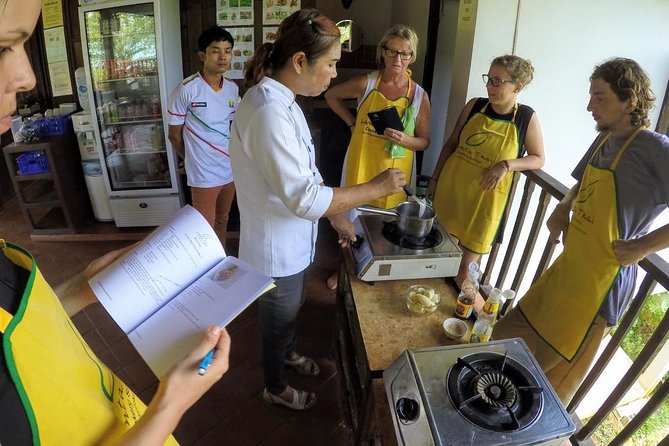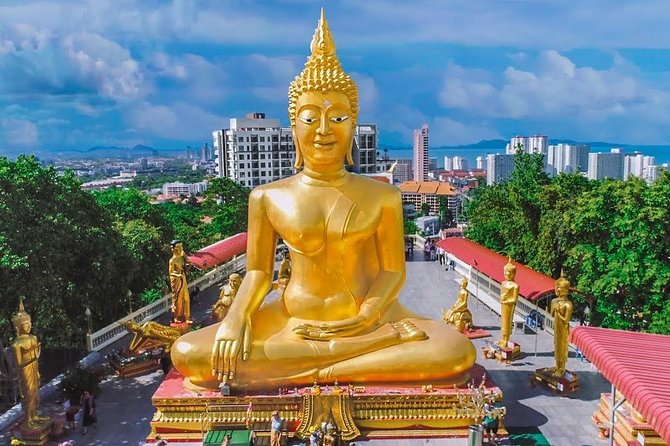Siem Reap, Cambodia offers more than just its famous temples and vibrant markets. Travelers can enjoy the local culture through the Siem Reap Cooking Class, operated by Angkor Wat Shared Tours.
This hands-on culinary experience takes place at Siem Reap Pub Hostel, allowing participants to learn the secrets of traditional Khmer cuisine. With small class sizes and expert guidance from local chefs, this cooking class promises an unforgettable gastronomic adventure, perfect for both seasoned chefs and kitchen novices.
Key Takeaways
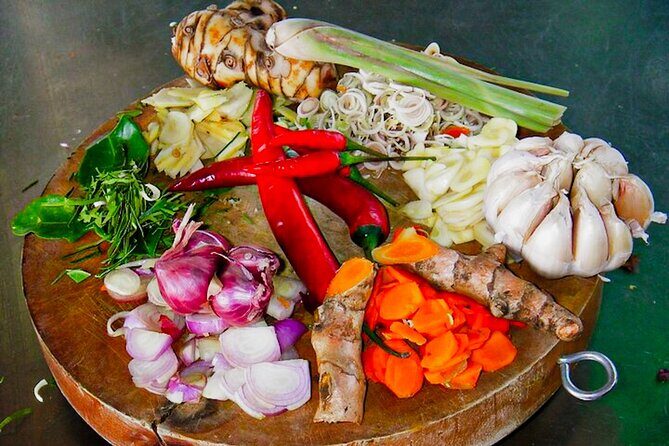
- Learn about and taste the flavors of Traditional Khmer Cuisine in Siem Reap, Cambodia
- Gain insight into the traditional cooking methods used in this region
- Explore vibrant local markets to select fresh ingredients
- Actively participate and enhance culinary skills
Traditional Khmer Cuisine
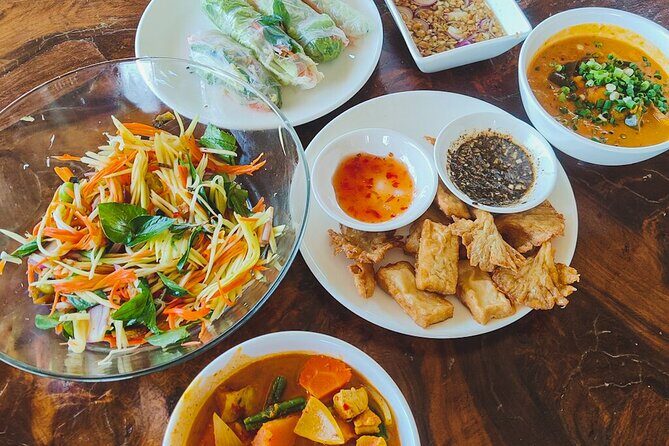
The cooking class offers travelers an opportunity to learn about and taste the flavors of Traditional Khmer Cuisine in Siem Reap, Cambodia. Participants will discover the secrets behind popular Khmer dishes and gain insight into the traditional cooking methods used in this region. Led by experienced local chefs, this hands-on experience allows participants to enjoy the culinary heritage of Cambodia.
During the class, you will learn how to prepare iconic Khmer dishes such as Amok, a fragrant fish curry steamed in banana leaves, and Lok Lak, a flavorful stir-fried beef dish. They’ll also have the chance to explore the vibrant local markets, where they’ll select fresh ingredients for their cooking.
The chefs will guide participants through each step of the cooking process, revealing techniques that have been passed down through generations. From pounding spices in a mortar and pestle to simmering curries over an open fire, you will gain a deep appreciation for the labor and skill involved in Khmer cooking.
At the end of the class, you will savor the fruits of their labor by enjoying the dishes they’ve prepared, accompanied by traditional Khmer sauces and condiments. This experience not only provides a delicious meal but also serves as a gateway to understanding the rich culinary traditions of Cambodia.
Authentic Cooking Techniques

Participants in the Siem Reap cooking class will learn authentic cooking techniques, such as pounding spices and simmering curries, from experienced local chefs. This hands-on experience immerses participants in the vibrant flavors and culinary traditions of Cambodia. The class emphasizes the use of fresh, local ingredients to create authentic recipes and traditional dishes.
Along With the practical skills taught, you will also gain a deeper understanding of the cultural significance of Khmer cuisine. The class provides a unique opportunity to explore the rich history and traditions that have shaped Cambodian cooking.
To provide a glimpse into the exciting world of Cambodian cuisine, here is a table showcasing some popular ingredients and dishes:
| Ingredient | Dish | Flavor Profile |
|---|---|---|
| Lemongrass | Fish Amok | Fragrant and Citrusy |
| Kroeung (Spice Paste) | Beef Lok Lak | Spicy and Aromatic |
| Tamarind | Sour Soup (Samlor) | Tangy and Refreshing |
Local Ingredients and Flavors

Using fresh, local ingredients, the chefs in the Siem Reap cooking class create flavorful dishes that showcase the unique flavors of Cambodia.
One of the highlights of this culinary experience is the local market exploration, where participants have the opportunity to select and purchase the ingredients they’ll be using in their cooking. This not only allows them to enjoy the vibrant local culture but also ensures the freshness and quality of the ingredients.
The cooking class is known for its fusion of Khmer and international flavors, creating a perfect balance between traditional Cambodian cuisine and global influences. Participants can expect to learn how to prepare dishes such as Fish Amok, a classic Khmer curry, and Mango Sticky Rice, a popular dessert.
With expert guidance from the chefs and the use of local ingredients, the Siem Reap cooking class offers a truly authentic and unforgettable culinary experience.
Hands-on Cooking Experience
Everyone in the cooking class gets a chance to actively participate and enhance their culinary skills by having a hands-on cooking experience. This type of interactive learning allows individuals to not only learn recipes and techniques but also develop a deeper understanding of the cooking process. By actually engaging in the preparation and cooking of dishes, participants can improve their knife skills, learn proper cooking techniques, and gain confidence in the kitchen. The benefits of a hands-on cooking experience extend beyond just improving culinary skills. It also provides an opportunity for individuals to explore different flavors, experiment with ingredients, and develop their own unique cooking style. Overall, participating in a cooking class can be a fun and educational way to enhance one’s culinary skills while enjoying the process of creating delicious meals.
| Cooking Class Benefits | Culinary Skills Development | Personal Satisfaction |
|---|---|---|
| Learn new recipes | Improve knife skills | Discover new flavors |
| Gain confidence | Learn proper techniques | Experiment with ingredients |
| Develop unique style | Enhance flavor combinations | Enjoy the cooking process |
Expert Guidance From Local Chefs
The local chefs at the Siem Reap Cooking Class provide expert guidance and valuable tips to enhance participants’ culinary skills.
Here are three reasons why cooking with local ingredients and preserving traditional cuisine are important:
-
Benefits of cooking with local ingredients: Using locally sourced ingredients not only supports the local economy, but also ensures freshness and quality in the dishes. Local ingredients often have unique flavors and textures that add depth to the culinary experience.
-
The importance of cultural preservation through traditional cuisine: Traditional dishes are an integral part of a country’s cultural heritage. By learning and preserving traditional recipes, participants can contribute to the preservation of cultural identity. Traditional cuisine often reflects the history, customs, and traditions of a region, allowing people to connect with the local culture on a deeper level.
-
Experiencing the authentic flavors: Cooking with local ingredients and following traditional recipes allows participants to experience the authentic flavors of a destination. Each region has its own distinct culinary traditions, and by immersing oneself in the local cuisine, participants can truly taste the essence of the place they’re visiting.
Tasting and Enjoying Your Creations
After completing the Siem Reap Cooking Class, participants can taste and enjoy their delicious creations with their fellow classmates. This culinary adventure not only provides hands-on cooking experience but also offers numerous benefits.
The cooking class benefits participants by teaching them new recipes, techniques, and tips that they can take home and use in their own kitchens. It allows them to enjoy the local culture through the exploration of traditional Cambodian cuisine.
The class provides an opportunity to interact with local chefs, who offer expert guidance and share their knowledge of the ingredients and flavors unique to the region. Participants can savor the fruits of their labor and bond with their classmates over a shared appreciation for food.
The Siem Reap Cooking Class promises a memorable and fulfilling culinary experience.
Cultural Insights and Food History
Participants in the Siem Reap Cooking Class gain cultural insights and deepen their understanding of food history through hands-on culinary exploration. Here are three reasons why this experience is a must for those interested in food traditions and culinary heritage:
-
Immersive Learning: The cooking class offers a unique opportunity to learn about the local food traditions of Cambodia. Participants get to work with traditional ingredients and techniques, guided by experienced chefs who share their knowledge and expertise.
-
Historical Context: The class delves into the rich culinary heritage of Siem Reap, providing a historical context for the dishes being prepared. Participants learn about the origins of different recipes and how they’ve evolved over time, connecting the present-day cuisine to its roots.
-
Cultural Exchange: Through cooking and sharing a meal together, participants engage in a cultural exchange with the local community. They not only learn about the food but also gain insights into the customs, traditions, and values that are intertwined with the culinary practices of Siem Reap.
Take Home Recipes and Memories
She can’t wait to jot down the delicious recipes and make lasting memories from the Siem Reap Cooking Class.
In this immersive culinary experience, participants not only learn how to cook authentic Cambodian dishes but also get to explore the local market for fresh ingredients. The class begins with a visit to the bustling market, where the instructor provides valuable cooking tips and insights into the local produce. Participants have the opportunity to interact with vendors, taste exotic fruits, and select the best ingredients for their dishes.
Once back in the kitchen, the instructor guides them through the step-by-step process of preparing traditional Cambodian dishes, such as Amok, a fragrant curry, and Nom Banh Chok, a popular noodle dish.
Frequently Asked Questions
What Is the Maximum Number of Travelers Allowed in the Siem Reap Cooking Class?
The maximum number of travelers allowed in the Siem Reap Cooking Class is eight. This ensures a small group setting, allowing for a personalized experience and ample opportunity for interaction with the instructor.
Is the Siem Reap Cooking Class Wheelchair Accessible?
The Siem Reap Cooking Class is not wheelchair accessible. However, you will have the opportunity to learn various cooking techniques and enjoy a delicious culinary experience.
Where Is the Meeting Point for the Siem Reap Cooking Class Located?
The meeting point for the Siem Reap Cooking Class is located at Siem Reap Pub Hostel, behind Angkor Night Market. It is easily accessible by public transportation.
How Far in Advance Should I Cancel the Siem Reap Cooking Class to Receive a Full Refund?
To receive a full refund for the Siem Reap Cooking Class, it is necessary to cancel at least 24 hours in advance. Any cancellations made less than 24 hours before the start time are not eligible for a refund.
Are There Any Public Transportation Options Near the Siem Reap Cooking Class Meeting Point?
Public transportation options near the meeting point of the Siem Reap Cooking Class include tuk-tuks and taxis. These convenient modes of transportation can be easily found in the area, providing travelers with easy access to the class.
The Sum Up
To sum it up, the Siem Reap Cooking Class offers a fantastic opportunity for travelers to enjoy the rich culture of Cambodia through traditional Khmer cuisine. With expert guidance from local chefs, participants can learn authentic cooking techniques and explore the vibrant flavors of local ingredients. The hands-on cooking experience, combined with cultural insights and food history, ensures an unforgettable gastronomic adventure. Don’t miss the chance to take home not only delicious recipes but also cherished memories of your time in Siem Reap.
If you’re interested in exploring other cooking experiences in Asia, there are several options worth considering. One such option is the Khmer Cooking Class at a Local’s Home in Krong Siem Reap. This unique experience allows you to learn traditional Khmer recipes in an authentic local setting, providing a deeper understanding of Cambodian culture and culinary traditions.
Another interesting cooking class is the Hanoi Cooking Class with Market Trip. This experience takes you on a culinary journey through the bustling markets of Hanoi, where you’ll handpick fresh ingredients for your cooking session. From learning how to make traditional Vietnamese dishes to gaining insights into the local food culture, this cooking class offers a truly immersive experience.
For those visiting Nepal, the Half-Day Cooking Class in Thamel, Kathmandu is a must-try. This class allows you to learn the art of Nepalese cooking and discover the unique blend of flavors and spices used in their cuisine. With a visit to the local market to source ingredients and hands-on cooking lessons, you’ll gain a deeper appreciation for Nepalese culinary traditions.
These are just a few of the cooking experiences available in Asia. Each provides a unique opportunity to learn about local cuisines and cultures. Whether you choose to explore the Sabirama Cooking Class in Vietnam, the Phuket Thai Cooking Class in Thailand, or the Singaporean Cooking Class and Meal with Small Group in Singapore, you’re sure to have a memorable and educational culinary adventure.
So why limit yourself to just one cooking class experience? Consider exploring these other options in Asia and expanding your knowledge of regional cuisines.
